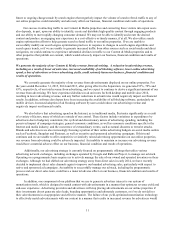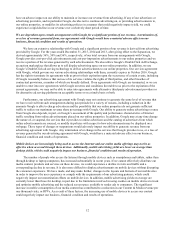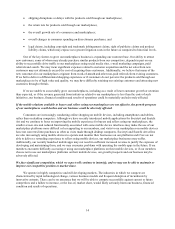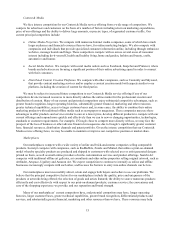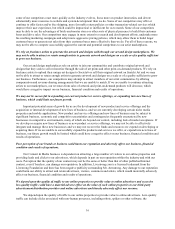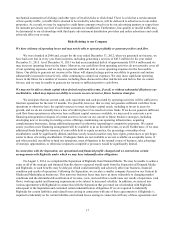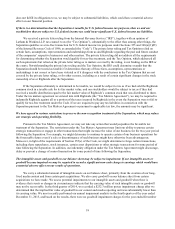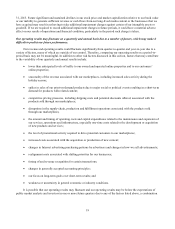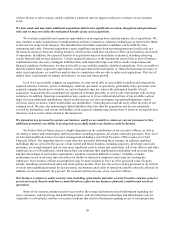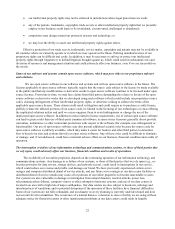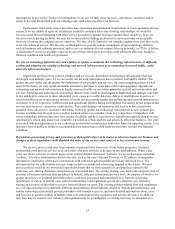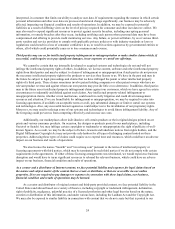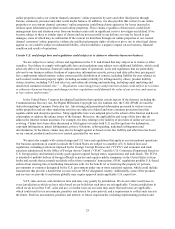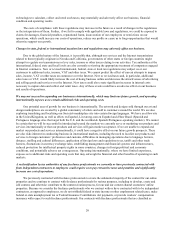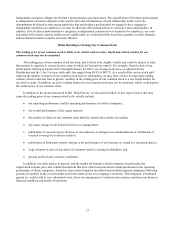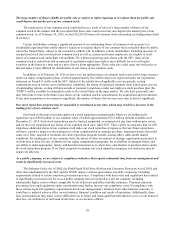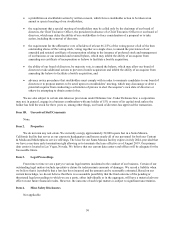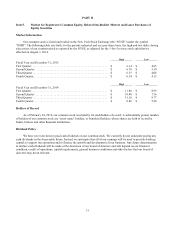Enom 2015 Annual Report Download - page 23
Download and view the complete annual report
Please find page 23 of the 2015 Enom annual report below. You can navigate through the pages in the report by either clicking on the pages listed below, or by using the keyword search tool below to find specific information within the annual report.21
information. An increasing number of websites have recently disclosed online security breaches, some of which have
involved sophisticated and highly targeted attacks on portions of their websites or infrastructure. Our security measures
may be breached and unauthorized parties may attempt to gain access to our systems and information through various
means, including hacking into our systems or facilities, fraud, employee error, malfeasance, or inserting malicious code
or malware into our code base. For example, in 2014 we determined that an unauthorized individual may have gained
access to the user names, email addresses and passwords of certain eHowNow customers. Additionally, outside parties
may attempt to fraudulently induce employees, users, or customers to disclose sensitive information or take other actions
by using fraudulent “spoof” and “phishing” emails. Outside parties may also introduce viruses or other malware through
“trojan horse” programs to our users’ computers in order to gain access to our systems and the data stored therein.
Because the techniques used to obtain unauthorized access, disable or degrade service, or sabotage systems change
frequently, often are not recognized until launched against a target and may be difficult to detect for a long time, we may
be unable to anticipate these techniques or to implement adequate preventive measures. Any security breach or
unauthorized access could result in a misappropriation of our proprietary information or the proprietary information of
our users, customers or partners, which could result in significant legal and financial exposure, an interruption in our
operations and damage to our reputation. If an actual or perceived breach of our security occurs, the market perception of
the effectiveness of our security measures could be harmed and we could lose users, customers, advertisers or publishers,
all of which could have a material adverse effect on our business, financial condition and results of operations. Any
security breach at a company providing services to us or our users, including third party payment processors, could have
similar effects and we may not be fully indemnified for the costs we may incur as a result of any such breach. In
addition, we may need to expend significant resources to protect against security breaches or to address problems caused
by a breach, and the coverage limits on our insurance policies may not be adequate to reimburse us for any losses caused
by security breaches.
We are subject to risks and compliance rules and regulations related to the third party credit card payment processing
solutions integrated with our websites.
Many of our customers pay amounts owed to us using a credit card or debit card. For credit and debit card
payments, we pay payment processing fees in addition to interchange and other fees, which may increase over time and
raise our operating expenses and adversely affect our net income. We are also subject to payment card association
operating rules, certification requirements and rules governing electronic funds transfers, which could change or be
reinterpreted to make it difficult or impossible for us to comply. We believe we and our payment processing service
providers are compliant in all material respects with the Payment Card Industry Data Security Standard, which
incorporates Visa’s Cardholder Information Security Program and MasterCard’s Site Data Protection standard.
However, there is no guarantee that such compliance will be maintained or that compliance will prevent illegal or
improper use of our systems that are integrated with our payment processing providers. If any of our third party payment
processors fails to be in compliance with applicable credit card rules and regulations, we may be required to migrate to
an alternate payment processor which could result in transaction downtime during the migration and/or a loss of
customers and have a material adverse effect on our business, financial condition and results of operations.
If we do not adequately protect our intellectual property rights, our competitive position and business may suffer.
Our intellectual property, consisting of trade secrets, trademarks, service marks, patents and copyrights, is, in the
aggregate, important to our business. We rely on a combination of trade secret, trademark, copyright and patent laws in
the United States and other jurisdictions together with contractual provisions and technical measures to protect our
proprietary rights. We rely more heavily on trade secret protection than patent protection. To protect our trade secrets,
we control access to our proprietary systems and technology, including our platforms, and we enter into confidentiality
and invention assignment agreements with our employees and consultants, as well as confidentiality and non-disclosure
agreements with other third parties. We face risks related to our intellectual property including that:
x because of the relatively high cost we would experience in registering all of our copyrights with the United
States Copyright Office, we generally do not register the copyrights associated with our content;
x our ability to assert our intellectual property rights against potential competitors or to settle current or future
disputes may be limited by our agreements with third parties;


